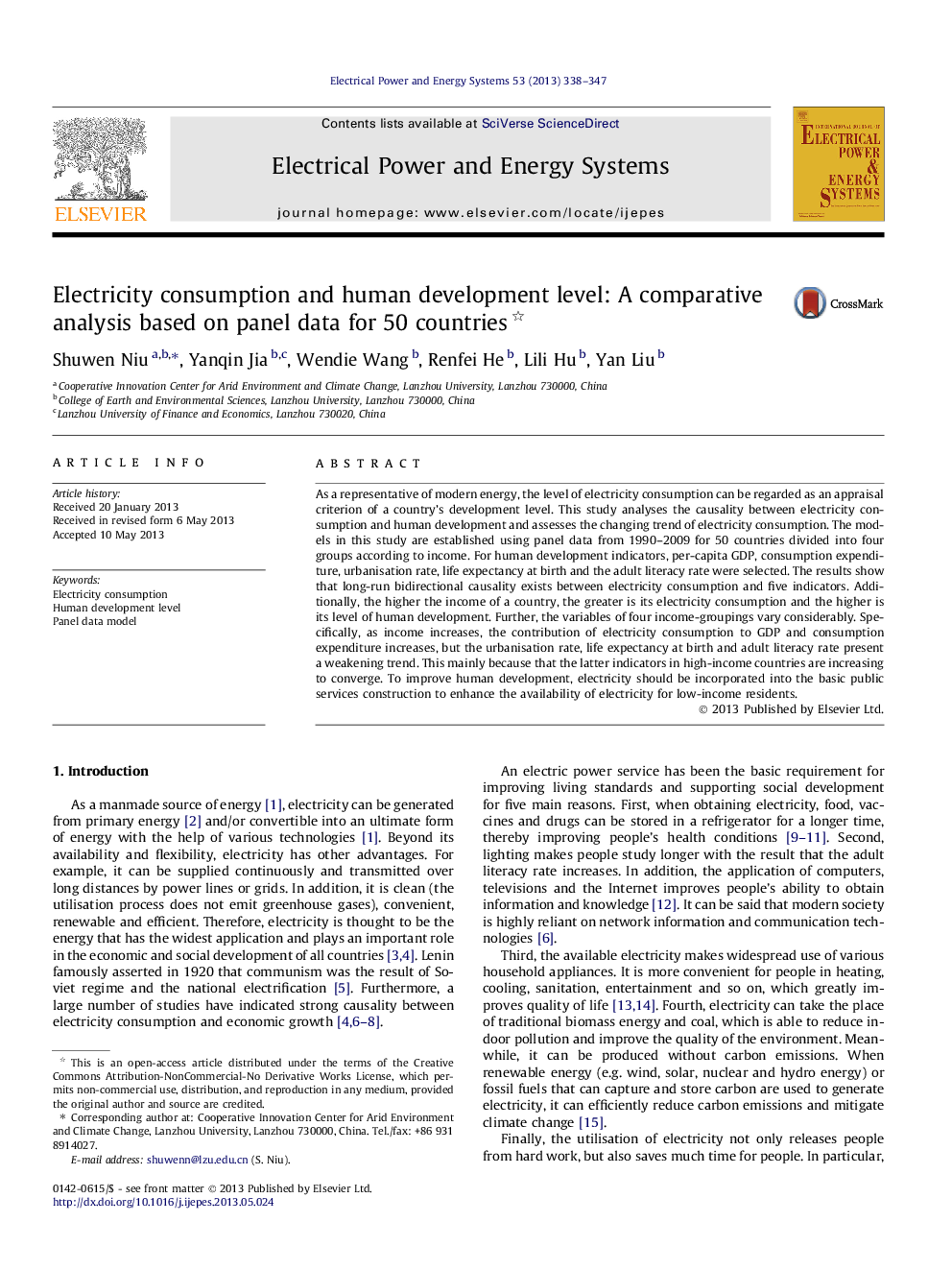| کد مقاله | کد نشریه | سال انتشار | مقاله انگلیسی | نسخه تمام متن |
|---|---|---|---|---|
| 6860700 | 1438747 | 2013 | 10 صفحه PDF | دانلود رایگان |
عنوان انگلیسی مقاله ISI
Electricity consumption and human development level: A comparative analysis based on panel data for 50 countries
ترجمه فارسی عنوان
مصرف برق و سطح توسعه انسانی: یک تجزیه و تحلیل تطبیقی بر اساس داده های پانل برای 50 کشور
دانلود مقاله + سفارش ترجمه
دانلود مقاله ISI انگلیسی
رایگان برای ایرانیان
کلمات کلیدی
مصرف برق، سطح توسعه انسانی، مدل داده پانل،
ترجمه چکیده
به عنوان یک نماینده انرژی مدرن، میزان مصرف برق می تواند به عنوان معیار ارزیابی سطح توسعه کشور در نظر گرفته شود. این مطالعه رابطه علیت بین مصرف برق و توسعه انسانی را تحلیل می کند و روند تغیرات مصرف برق را ارزیابی می کند. مدل های این مطالعه با استفاده از داده های پانل از سال های 1990 تا 2009 برای 50 کشور تقسیم شده به چهار گروه با توجه به درآمد. شاخص های توسعه انسانی، تولید ناخالص داخلی سرانه، هزینه مصرف، نرخ شهری، امید به زندگی در هنگام تولد و میزان سواد بزرگسالان انتخاب شدند. نتایج نشان می دهد که علیت بین دو طرفه طولانی مدت بین مصرف برق و پنج شاخص وجود دارد. علاوه بر این، بالاتر از درآمد یک کشور، مصرف برق آن بیشتر است و سطح پیشرفت انسانی آن بالاتر است. علاوه بر این، متغیرهای چهار گروه درآمد قابل توجهی متفاوت است. به طور خاص، با افزایش درآمد، سهم مصرف برق در تولید ناخالص داخلی و مصرف هزینه افزایش می یابد، اما نرخ شهری، امید به زندگی در هنگام تولد و نرخ سواد بالاتری روند تضعیف را نشان می دهد. این به طور عمده به این دلیل است که شاخص های اخیر در کشورهای با درآمد بالا برای همگونی افزایش می یابد. برای بهبود توسعه انسانی، برق باید در ساخت خدمات عمومی عمومی گنجانده شود تا امکان دسترسی به برق برای ساکنان کم درآمد فراهم شود.
موضوعات مرتبط
مهندسی و علوم پایه
مهندسی کامپیوتر
هوش مصنوعی
چکیده انگلیسی
As a representative of modern energy, the level of electricity consumption can be regarded as an appraisal criterion of a country's development level. This study analyses the causality between electricity consumption and human development and assesses the changing trend of electricity consumption. The models in this study are established using panel data from 1990-2009 for 50 countries divided into four groups according to income. For human development indicators, per-capita GDP, consumption expenditure, urbanisation rate, life expectancy at birth and the adult literacy rate were selected. The results show that long-run bidirectional causality exists between electricity consumption and five indicators. Additionally, the higher the income of a country, the greater is its electricity consumption and the higher is its level of human development. Further, the variables of four income-groupings vary considerably. Specifically, as income increases, the contribution of electricity consumption to GDP and consumption expenditure increases, but the urbanisation rate, life expectancy at birth and adult literacy rate present a weakening trend. This mainly because that the latter indicators in high-income countries are increasing to converge. To improve human development, electricity should be incorporated into the basic public services construction to enhance the availability of electricity for low-income residents.
ناشر
Database: Elsevier - ScienceDirect (ساینس دایرکت)
Journal: International Journal of Electrical Power & Energy Systems - Volume 53, December 2013, Pages 338-347
Journal: International Journal of Electrical Power & Energy Systems - Volume 53, December 2013, Pages 338-347
نویسندگان
Shuwen Niu, Yanqin Jia, Wendie Wang, Renfei He, Lili Hu, Yan Liu,
